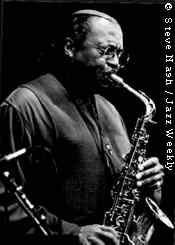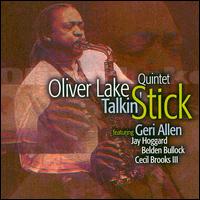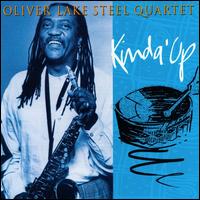
A
FIRESIDE CHAT WITH OLIVER LAKE
As a card carrying member of the World Saxophone Quartet, Oliver Lake
has always had a special place in my heart. I can't think of many musicians
that have taken as many risks as Lake, but to him, they probably aren't
risks. That is the genius of the man. Enjoy folks. It is brought to you
unedited and in his own words.
FRED JUNG: Let's start from the beginning.
OLIVER LAKE: I was hanging out with guys like Lester Bowie and Phillip Wilson.
Later on, in St. Louis, we started a group called the Black Artists Group,
which was in the late Sixties and that had music, dance, poetry, theater,
and so forth and that was like a big learning situation for me. Julius Hemphill
was a part of that group. Hamiet Bluiett was a part of it. I was working
with poets, dancers, musicians, and I think that really planted the seeds
for my future career in terms of working with poetry, which I have a book
of poems and I have a CD of poetry and so forth. Big band, working with
big bands, I just did a month of Mondays at Sweet Basil in March with a
big band. And small groups, my current small group is with a steel quartet
and we have a new CD on Justin Time called Kinda' Up, and so it was a real
good basis for everything that I'm doing, from solos to writing for dancers,
to doing poetry and all of that. I think in '74, I moved to Paris with a
group from St. Louis and stayed there a couple of years, oh no, it must
have been '72, and then in '74, I moved to New York and around the latter
part of that year, we started the World Saxophone Quartet, which has been
going about twenty-three, twenty-four years.
FJ: Influences?
OLIVER LAKE: Oh, they haven't changed too much, Fred. I was really attracted
to Jackie McLean's alto sound and the way he played what they call post
bebop or bebop. I was really attracted to Eric Dolphy and the things that
he was doing and the fact that his stuff was so unpredictable. I think when
I heard him, I was like, "Wow, that is unpredictable. That's got to be the
route that I take." That is what Eric Dolphy kind of epitomized for me.
Duke Ellington as a composer. When I compose, I have composed a lot of pieces
over the years, but it turns out that it seems that Duke Ellington had already
done everything that I've tried to do in any genre. He's been a big inspiration
from that point of view. I think Miles Davis too from the way he kept growing
and changing and moving and turning and I think that those have been some
of the real strong influences on me.
FJ: How did the World Saxophone Quartet come about?
OLIVER LAKE: Well, Julius, I had met years ago in St. Louis in the Black
Artists Group, when I started around '68, '69. He was in St. Louis and had
just gotten out of the service and he was a part of that group. So our history
went all the way back to there and then he moved to New York a couple of
years before I did and so when I got here, he was already set up. He was
one of the first persons I looked up. That same year I moved here, David
Murray moved here from California and Bluiett had been here a couple of
years and he was working. He had been working with Charlie Mingus on the
road. So out of Julius, Bluiett, Murray, and myself, I was the last one
to move to New York, but I went via Paris. We got here and we just continued
to do the things we were doing in St. Louis, presenting ourselves and doing
concerts. Bluiett had started a big band during that period in the mid-'70s
here in New York and Julius was doing a lot of projects and when David came
in, we all started playing together in various projects. There was a saxophone
player and there still is a saxophone player named Kidd Jordan, who is from
New Orleans and he came up and was listening to various saxophone players
and he liked the four of us and our different groups and he teaches in New
Orleans at one of the schools down there and he wanted to bring the four
of our groups down there to perform. He realized he couldn't afford to bring
all four groups and so he wanted each one of us to come together as a quartet
and he'd put a rhythm section with us. I think that was 1976. and we did
go down to New Orleans with Bluiett, Murray, Julius, and myself, and did
the concert with the rhythm section from New Orleans and the response was
so tremendous, it almost literally frightened us. People were screaming
and hollering as if they were at some Beatles' concert. After we came off
stage, we couldn't believe what had happened. It was like some kind of magical
thing had happened. So when we finished and we did a couple of nights and
each night the concert was packed and the people went crazy with the music.
And we said, "Well, if this response is happening, we've got to keep this
together." So when we came back to New York, we started talking about who
would be our rhythm section and we could never agree on who to get in the
rhythm section. I think I mentioned that we had all done solos and duos
before without rhythm sections and why don't we do the first concert in
New York without a rhythm section and that was the start of the World Saxophone
Quartet.
FJ: Finding a replacement for Julius' seat has been a revolving door of
late.
OLIVER LAKE: Julius left the group a couple of yeas before he passed and
when he left the group, he started his Sextet and if I am remembering correctly,
the first saxophonist to come in after Julius had left the group was Arthur
Blythe. And Arthur, who is a fabulous player and we did the first record
after Julius left and Arthur was on that CD. It was a transition because
Julius was the main composer for the World Saxophone Quartet. All of us
were composing, but he was doing the majority of it and so the sound of
the Saxophone Quartet was pretty much established in Julius' writing. It
meant that the three of us, me, Bluiett, and Murray, had to move more forward
in terms of writing for the Quartet. We were all composers so we were all
trying to do that and not try to copy what Julius had done, because what
he did was tremendous as a writer and composer and the music that he left
us was tremendous. I think the next saxophone player was James Spaulding
and he stayed about a year. We recorded a CD with him and then we used Eric
Person, who was another saxophonist from St. Louis and he stayed with us
for a little while. And now it John Purcell.
FJ: Let's touch on the latest World Saxophone Quartet release on Justin
Time, Requiem for Julius.
OLIVER LAKE: It is reminiscing on Julius. It is a dedication to Julius,
remembering him as a great composer, for me, a great friend and saxophonist.
We're just kind of making a musical dedication to Julius.
FJ: And your own recording with your Steel Quartet.
OLIVER LAKE: We did a CD release party last night at a club uptown and it
went pretty good. It is kind of strange, Fred, because I didn't really have
the idea. It was a producer from Europe who wanted to record me, and he
said he was really interested in recording me, but he only wanted to record
me with a steel pan and for me to find a steel pan player to record with
because he kept imagining what my sound would sound like with a steel pan
and I said that is a great idea. So I started putting the word out for a
steel player who had a lot of depth and range and could do different things
and I kept getting Lyndon Achee. I got that name from about four people.
So I got his number. He lives in Brooklyn, but he is from Trinidad. I called
him up and we got together and we played through a couple of standards and
I brought him some of my originals and when we got through, I was like,
"Wow, this is the cat."
FJ: Joe Public may find a steel pan in jazz as odd, but it mirrors improvising
alongside a vibe player.
OLIVER LAKE: Exactly. I thought the same thing. It is very similar to working
with vibes and Lyndon does play vibes and he does play marimbas and he plays
a lot of percussion and I haven't even had the opportunity to integrate
that into the Quartet. Tonight, we are actually doing a duo concert. It
was especially interesting to me to hear the blend of the steel pan and
the saxophone. A lot of the stuff, even if we do it in unison, it just gets
a certain sound that people are immediately commenting on the sound of the
saxophone and the steel pan together. I am actually looking to see how many
more sax players are going to add to their group. I am trying to make record
now that I was one of the first saxophone players. There are several piano
players that had steel pans working, Ahmad Jamal and Monty Alexander.
FJ: Jim Hall as well.
OLIVER LAKE: Right. But no saxophone players. I am waiting for that to start
catching on.
FJ: You must have to restrain yourself from breaking out into calypso numbers.
OLIVER LAKE: (Laughing) Well, Fred, that is kind of the fun of it because
we touch on both things. That is why I wanted this CD to have some standards
like the Mingus piece and the Coltrane piece and some of the kinds of stuff
that deals with reggae and calypso. I wanted to show a full range that I
am not going to feel restricted because of steel pan that we are going to
play traditional steel pan music. Anywhere I go, Lyndon can follow. He's
a great player. We are going to do our first European tour with this band
in May for about sixteen, seventeen days. I'm looking forward to that.
Fred Jung is Editor-In-Chief and has DNA evidence. Comments? Email
him.


